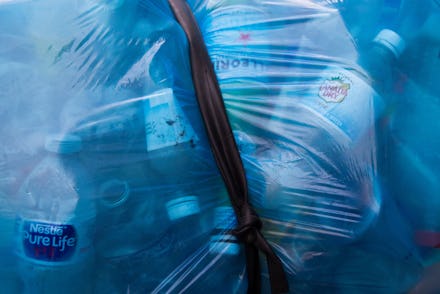Canada plans to majorly reduce waste by banning single-use plastics by 2021

Plastic bags, straws and other products soon will no longer be welcome in Canada. Prime Minister Justin Trudeau announced on Monday that Canada plans to ban "harmful single-use plastics" by 2021. And while it's not yet clear exactly what plastics those will be, Trudeau made transparent what the country's goals are.
“People have had enough of seeing their parks and beaches covered with plastic,” Trudeau said during a press conference held at Mont St-Hilaire, just outside of Montreal. “As parents we’re at a point when we take our kids to the beach and we have to search out a patch of sand that isn’t littered with straws, Styrofoam or bottles. That’s a problem, one that we have to do something about.”
Canada could certainly stand to cut down on its plastic consumption. According to the Canadian government, the country of 37 million people produces more than three million tons of plastic waste each year. (By comparison, the United States and its 330 million people produced 38.5 million tons of plastic waste last year.) A not insignificant portion of that comes from the types of single-use products that many people interact with each day: 57 million plastic straws are used every day in the country and 15 billion plastic bags are used every year.
Troublingly, less than 10 percent of the country's plastic gets recycled — an issue that has been exacerbated by China no longer accepting plastic waste from countries for the purpose of reusing it. According to The Weather Network, 90 percent of Canada's plastic waste ends up incinerated, dumped in landfills or littered in lakes, parks and oceans. Once in the environment, that waste can persist for up to 600 years, during which it kills wildlife, releases toxic chemicals and compromises natural ecosystems.
This issue doesn't just exist in Canada, of course. The World Economic Forum estimates the worldwide total volume of plastic has reached 8.3 billion metric tons. The vast majority of that plastic, 6.3 billion tons, has been disposed of as waste rather than recycled. A study conducted by researchers at the University of Georgia found 12 percent of that remaining waste has been incinerated—an option that has less of a negative impact on the environment than burying waste but still carries a significant environmental burden. The vast majority of it, 79 percent, ends up in landfills which often leaches into the environment and regularly ends up in the ocean. It's projected that if our global plastic consumption continues at the current pace, we will end up with 12 billion metric tons of plastic in landfills by 2050, according to National Geographic.
That is where actions like those taken by the Canadian government become valuable in attempting to curb our consumption. A concentrated effort to eliminate needless plastic waste is necessary to quickly shrink the amount of waste that is produced. The country is following in the footsteps of the European Union, which recently approved its own ban on some single-use plastics that will go into effect in 2021.
The question is, just how effective will these changes be in shrinking the massive plastic footprint that we have already amassed? Single-use plastic products undoubtedly contribute significantly to our waste problem, but without any sort of mandates for environmentally alternatives, the law of unintended consequences could go into effect.
The World Resources Institute noted that disposable plastics often take fewer resources to produce than paper, cotton, and other reusable products. A paper bag would need to be reused 43 times to have less overall environmental impact than a plastic bag, and a cotton bag would require 20,000 uses to have a smaller environmental impact than a plastic alternative, according to Denmark’s Ministry of Environment and Food. Banning plastics will certainly cut down on pollution, which is an issue that requires swift action to address. But alternatives carry a cost of their own that will likewise need more scrutiny going forward.